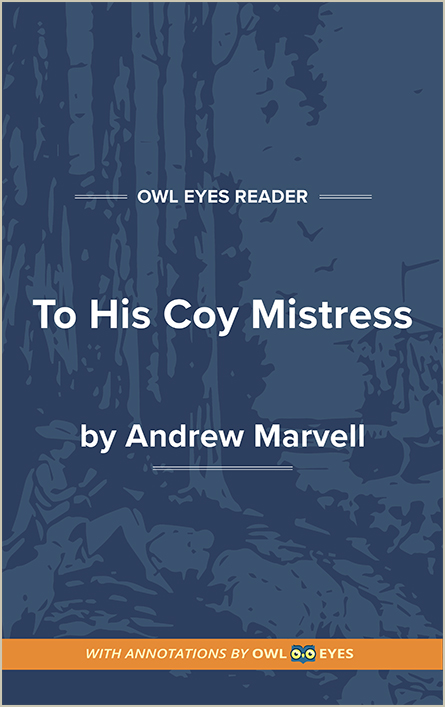Study Guide
Analysis Pages
Summary
In “To His Coy Mistress,” his most famous poem, Andrew Marvell follows many of the conventions of the carpe diem (Latin for “seize the day”) theme in poetry. This type of poem dates from ancient times and was made popular in English in the late sixteenth and early seventeenth centuries by such writers as Sir Walter Ralegh, Christopher Marlowe, and Robert Herrick. In such poems, typically, the speaker is an eager male lover lamenting the brevity of life to persuade his female listener to yield to his sexual advances. Thus a carpe diem complaint is perhaps best understood not as a love poem but as a lust poem.
Marvell adheres to this tradition in several ways, but he dispenses with the pastoral scenery and songlike lyrical quality typical of much carpe diem verse. Marvell cleverly invests this pagan argument (life is short and uncertain, so one must partake of all the pleasures one can) with somewhat melancholy Christian allusions. His poem is more ambitious as art than is the standard shepherd’s lament. Marvell frames the familiar urgings of the frustrated lover within three strictly organized verse paragraphs that resemble a three-part syllogism, a formula logicians use to demonstrate the validity of an argument. The argument in the poem concerns sexual gratification. The speaker’s premise in the first verse paragraph describes the rate at which he would woo the lady, given time enough to do so properly. In the second verse paragraph, the premise is the blunt fact of human mutability: Time is limited. In his conclusion, Marvell’s speaker resolves these conflicts—figuratively, at least.
Marvell’s poem’s originality of structure has contributed to the work’s being ranked as the epitome of carpe diem verse. Everything contributes to the speaker’s overall urgency. Marvell’s clipped, tetrameter (four-beat) rhymed couplets create a hurried pace. The poem begins, for example, with two closed couplets, or couplets of a single sentence each. This clipped beginning hints at urgency. As the speaker gains confidence, he loosens this form and uses more enjambment, running lines over into the following lines more often. By the third verse paragraph, he seems hardly to pause for breath at all. The variety of allusion, metaphor, and other figures of speech give the poem an exuberance appropriate to its theme.
As if to call attention to the fleetingness of time, the speaker opens with a terse, elliptical statement, not wasting even a syllable in his wooing. “Had we but world enough, and time” saves him from having to utter the only slightly longer “If we had,” and “This coyness, lady, were no crime” similarly condenses the more customary and conversational “would be no crime.” In this opening couplet, then, the speaker argues that time and distance—not his own impulsiveness or lust—are the primary enemies of love. If men and women had all eternity and all the world to devote to each other, “coyness” (her refusing his amorous suggestions) would hardly bother him. As it is, however, he deems coyness a crime against his emotions and her own—indeed, perhaps a crime against nature. He then offers examples of how, if immortal, they would pass their “long love’s day.” Part flattery, part display of his own inventiveness, wit, and learning, this catalog of praises follows the classical tradition of a list of charms designed to weaken the woman’s resistance and make her admirer’s advances more appealing.
Marvell’s speaker employs a wide range of such stratagems. He draws on geography, implying that the distance between two of the world’s rivers—the Ganges in India and the Humber in England—is somehow equal to the distance he feels lies between them as he makes this traditional lover’s complaint. From the tide of the Humber he moves to Noah’s flood (near the dawn of time) and then ahead to the “conversion of the Jews,” in Marvell’s day a proverbial reference to the end of the...
(The entire page is 1,597 words.)
Owl Eyes subscribers get unlimited access to our expert annotations, analyses, and study guides on your favorite texts. Master the classics for less than $5/month!

